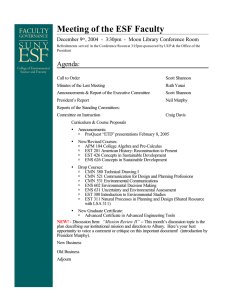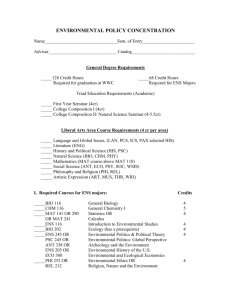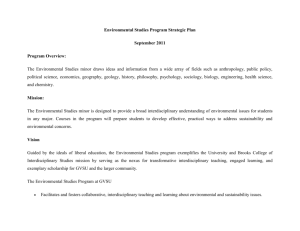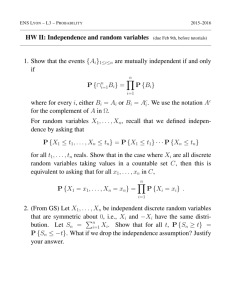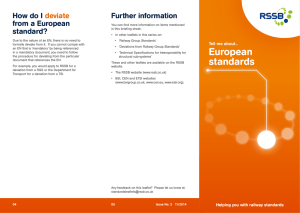Environmental Science - The Chinese University of Hong Kong
advertisement
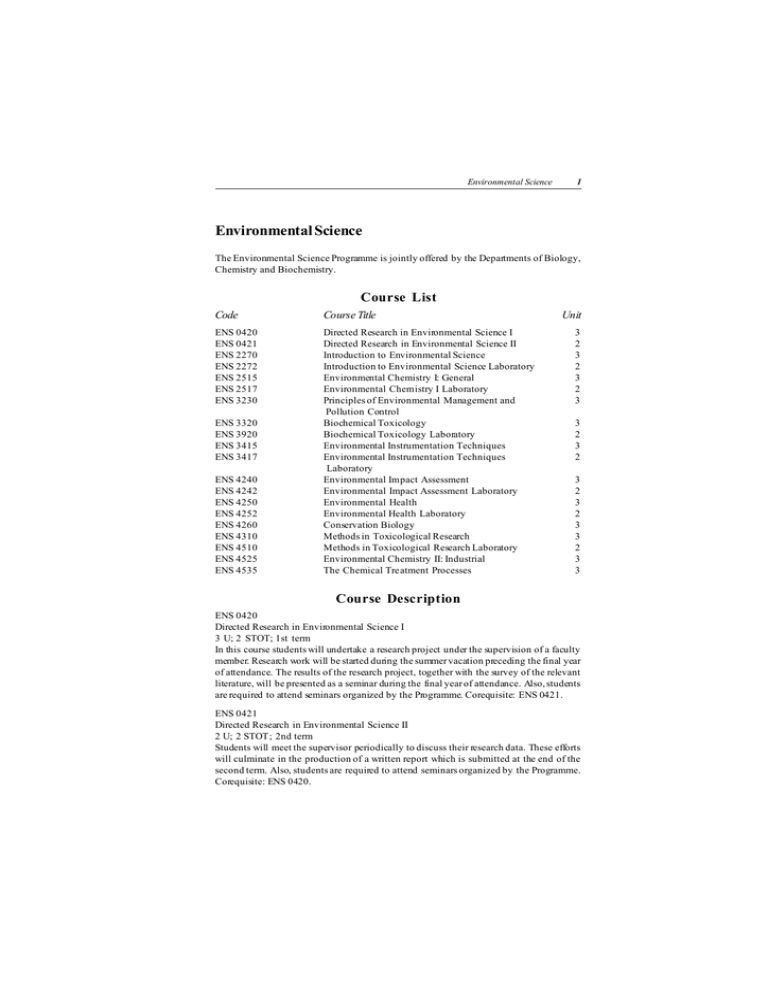
Environmental Science 1 Environmental Science The Environmental Science Programme is jointly offered by the Departments of Biology, Chemistry and Biochemistry. Course List Code Course Title ENS 0420 ENS 0421 ENS 2270 ENS 2272 ENS 2515 ENS 2517 ENS 3230 Directed Research in Environmental Science I Directed Research in Environmental Science II Introduction to Environmental Science Introduction to Environmental Science Laboratory Environmental Chemistry I: General Environmental Chemistry I Laboratory Principles of Environmental Management and Pollution Control Biochemical Toxicology Biochemical Toxicology Laboratory Environmental Instrumentation Techniques Environmental Instrumentation Techniques Laboratory Environmental Impact Assessment Environmental Impact Assessment Laboratory Environmental Health Environmental Health Laboratory Conservation Biology Methods in Toxicological Research Methods in Toxicological Research Laboratory Environmental Chemistry II: Industrial The Chemical Treatment Processes ENS 3320 ENS 3920 ENS 3415 ENS 3417 ENS 4240 ENS 4242 ENS 4250 ENS 4252 ENS 4260 ENS 4310 ENS 4510 ENS 4525 ENS 4535 Unit 3 2 3 2 3 2 3 3 2 3 2 3 2 3 2 3 3 2 3 3 Course Description ENS 0420 Directed Research in Environmental Science I 3 U; 2 STOT; 1st term In this course students will undertake a research project under the supervision of a faculty member. Research work will be started during the summer vacation preceding the final year of attendance. The results of the research project, together with the survey of the relevant literature, will be presented as a seminar during the final year of attendance. Also, students are required to attend seminars organized by the Programme. Corequisite: ENS 0421. ENS 0421 Directed Research in Environmental Science II 2 U; 2 STOT; 2nd term Students will meet the supervisor periodically to discuss their research data. These efforts will culminate in the production of a written report which is submitted at the end of the second term. Also, students are required to attend seminars organized by the Programme. Corequisite: ENS 0420. 2 Full-time Undergraduate Programmes of Study ENS 2270 Introduction to Environmental Science 3 U; 3 Lect.; 2nd term This course deals with the relationships between living organisms, resources and environment. The ecological viewpoint on resource processes such as agriculture, nature conservation, energy supply and utilisation, and waste production will be discussed. Case studies are included to illustrate the importance of the biological components in waste treatment as well as food and energy production from waste utilisation. ENS 2272 Introduction to Environmental Science Laboratory 2 U; 3 Lab.; 2nd term To accompan y ENS 2270. ENS 2515 Environmental Chemistry I: General 3 U; 3 Lect .; 1st term This is a foundation course designed to equip students with a proper understanding of the fundamental aspects of environmental chemistry. It introduces the basic concept of chemical equilibrium and kinetics, the nature and characteristics of various common types of air and water pollution arising from industrial, agricultural and domestic sources. It outlines the principles of measurement for various parameters commonly used for air and water pollution studies, their significance and limitations. It also examines the various types of aerial emission arising from combustion and industrial processes, and vehicles, and their chemical interaction leading to the formation of photochemical smog, depletion of ozone layer and global warming effects. ENS 2517 Environmental Chemistry I Laboratory 2 U; 3 Lab.; 1st term To accompan y ENS 2515. ENS 3230 Principles of Environmental Management and Pollution Control 3 U; 3 Lect.; 2nd term This coursediscusses the anthropogenic causes of environmental degradation and the approaches to environmental protection and pollution control. Students will be introduced: 1) the causes of environmental problems from a socio-economic viewpoint, 2) the concept of sustainability in environment al management, 3) th e development an d imp lemen tation of effect ive environmental programmes, 4) the role of legislation, economic measures and voluntary approach in environmental protection, and 5) control and treatment technologies and their comparative effectiveness in the abatement of various types of pollution. Management programmes and control strategies in tackling local environmental problems will be illustrated. ENS 3320 Biochemical Toxicology 3 U; 3 Lect.; 2nd term This course presents the fundamental basis of toxic action of chemical substances including environmental toxicants on living systems. Students will get an understanding of biologic mechanisms and principles related to toxicology. Environmental Science 3 ENS 3920 Biochemical Toxicology Laboratory 2 U; 3 Lab.; 2nd term To accompan y ENS 3320. ENS 3415 Environmental Instrumentation Techniques 3 U; 3 Lect .; 1st term This course aims to provide students with a basic understanding of the operational principles and application of various instrumental techniques commonly used for the studies of air and wat er po l lu t io n. It is d esi g ned t o cov er at o mi c abso rp ti o n (AA) and emissio n spectroph otometry, plasma emission spectrometry (ICP), op tical spect rosco py, x-ray spectroscopy, gas chromatography (GC), high-performance liquid chromatography (HPLC), mass spectrometry (MS), and electrochemical methods. Emphasis will be placed on the application of such techniques for pollution monitoring and preventive detection systems, especially with reference to the identification and determination of trace levels of toxic heavy metals, organic and organometallic compounds by means of AA, ICP Spectrometry and GC-MS. Prerequisite: ENS 2515 or by permission of the instructor. ENS 3417 Environmental Instrumentation Techniques Laboratory 2 U; 3 Lab.; 1st term To accompan y ENS 3415. ENS 4240 Environmental Impact Assessment 3 U; 3 Lect .; 1st term This course discusses the rational, techniques and procedures of evaluating environmental consequences arising from human activities such as urban development, landfill, waste disposal, sewerage discharge and resource utilisation. Students will be introduced to the origin and development of environmental impact assessment in Hong Kong as well as in other countries, the design of assessment procedures, the identification and quantitative evaluation of key issues, and other special topicsassociated with EIA, including strategicenvironmental assessment, cumulative impact analysis and statistical and environmental data analysis. Prerequisite: ENS 3230 or by permission of the instructor. ENS 4242 Environmental Impact Assessment Laboratory 2 U; 3 Lab.; 1st term To accompan y ENS 4240. ENS 4250 Environmental Health 3 U; 3 Lect.; 2nd term This course introduces the contemporary problems and issues in environmentally dependent aspects of health. Broad coverage of health effects of airborne and waterborne pollutants, pesticides, consumer product, and heavy metals are considered. Occupational exposure to chemical and physical hazards will also be discussed. ENS 4252 Environmental Health Laboratory 2 U; 3 Lab.; 2nd term To accompan y ENS 4250. 4 Full-time Undergraduate Programmes of Study ENS 4260 Conservation Biology 3 U; 3 Lect.; 2nd term This course aims to provide an in-depth discussion of conservation problems and solution. It requires students to have fundamental knowledge of biology and ecology. Major topics include conservation genetics, biodiversity, techniques in assessing biodiversity, problems of habitat fragmentation, design and role of reserves and protected areas, conservation of soil an d water reso urces, wildl ife and fish eries management, land u se, conservation of non-renewable mineral resources, energy use and conservation, conservation policy and laws. Emphasis will be given to problems critically important to today’s Hong Kong. ENS 4310 Methods in Toxicological Research 3 U; 3 Lect .; 1st term This course will i ntroduce to students cu rrent metho dologies co mmonly emplo yed in toxicological studies. The following techniques, chromatographic and electrophoretic methods, sedimentation, use of radioisotope, ultraviolet and fluorescence spectrophotometry, will be included. The determination of toxic pollutants and their metabolic conversion in biological systems will be discussed. Animal models in toxicity evaluation and molecular toxicology concepts will also be covered. ENS 4510 Methods in Toxicological Research Laboratory 2 U; 3 Lab.; 1st term To accompan y ENS 4310. ENS 4525 Environmental Chemistry II: Industrial 3 U; 3 Lect .; 1st term This course is designed to extend students’ understanding and develop their ability in the application of various aspects of environmental chemistry in relation to the major types of air and water pollution associated with industrial and vehicle emissions. It outlines the basic processes in bleaching and dyeing, electroplating and food processing that give rise to water pollution and applies physico-chemical techniques in controlling such pollution. It examines also combustion processes and the associated applications and limitations of the absorption, adsorption, oxidation-reduction and catalytic conversion techniques in relation to aerial emissions from furnaces and vehicles. Appropriate site visits will be arranged where possible to enhance students’ ability in application. ENS 4535 The Chemical Treatment Processes 3 U; 3 Lect.; 2nd term This course introduces the principles and applications of various chemical and physio-chemical processes appli cable for treatment and contro l of air and water pollution. It studies the processes of neutralization, ox idation-redu ction, chemi cal precipit ation, coagu lation, flocculation, physical separation, absorption, adsorption, filtration, chemical disinfection, solvent extraction, fractional distillation and incineration. It also examines the applicabilities and limitations of such processes with reference to the treatment and recovery of toxic and hazardous chemical wastes. Appropriate site visits will be arranged to enhance students’ ability in application. Environmental Science 5 Study Scheme 1. Major Programme Students are required to complete a minimum of 62-68 units of courses as follows: (i ) Required Courses: #BCH 2030/2730, #BIO 2210/2212, #4210/4212, ENS 2270/2272, 2515/2517, 3230, 3320/3920, 3415/3417, 4240/4242 43 units (ii) 5 o f the following El ective Courses (Among th e 5 co urses, stu dent s sh ou ld take at least 2 el ecti ve cou rses acco mpani ed by labo rat ory cou rses, o r ENS 0420/0421 with 1 elective course accompanied by labo ratory co urse.): (a) ENS 0420/0421, 4250/4252, 4260, 4310/4510, 4525, 4535 and (b) Ap p ro v ed el ec t i v es o ff ered b y o t h er Departments (Students should take no more than 2 courses from this category.): #BCH 4050/4650, #4510/4710, #BIO 3410/ 3412, #3710/3712, #4220/4222, #CHM 3130/ 3860, #GRM 2203, #3202, #3203 19-25 units Total: # 62-68 un its to be included in the Major GPA as well Note: Students should obtain Grade “D” or above in each of the courses of BCH 2030/ 2730, BIO 2210/2212, ENS 2270/2272 and 2515/2517. Otherwise, they are required to repeat the courses. Students who cannot meet the Grade “D” requirement in any one of the courses mentioned above after two attempts will be required to withdraw from the University. Please refer to Reg. 15.2(d) of the General Regulations Governing Full-time Undergraduate Studies. Reco mmended co urse pa ttern First Year of Attendance 1st term : BIO 2210/2212, ENS 2515/2517 2nd term : BCH 2030/2730, ENS 2270/2272 Second Year of Attendance 1st term : ENS 3415/3417, plus one elective course from (ii) above 2nd term : ENS 3230, 3320/3920, BIO 4210/4212 and optionally one extra elective course from (ii) above Third Year of Attendance 1st term : ENS 4240/4242 plus 3-4 elective courses from (ii) above 20 units 21-23 units 16-25 units Total: 62-68 un its 2. Minor Programme (i ) Students are required to complete a minimum of 18 units of courses as follows: (a) 2 courses from BIO 2210, ENS 2270, 2515 6 units (b) 2 courses from BCH 4050 (or BIO 4220), 6 units ENS 3230, 3320, 3415 (or CHM 3410/3870) 6 Full-time Undergraduate Programmes of Study (c) 2 courses from ENS 4240, 4250, 4260, 4310, 4525, 4535 6 units Total: 18 uni ts (ii) Certain prerequisite conditions for registering for the courses may be waived; intending Minor students should consult the Office of Environmental Sci ence Programme individually. 3. Faculty Language Requirement A. Applicable to students admitted in 2002-03 and thereafter English (a) Environmental Science Majors who have obtained Grade “D” or below in HKALE* AS “Use of English” are required to take and pass one of the following English courses to fulfil the Faculty language requirement in their first year of attendance: ELT 11 06 Grammar for University Studies ELT 11 10 Communication for Business Studies ELT 20 00 English for Career Preparation Students are encouraged to takeELT 1106 as their first choice, then ELT 2000 and lastly ELT 1110. (b) Where thereare time table clashes, students may enrol on other ELT courses, subject to the advice of the English Language Teaching Unit and approval of the Department/Programme concerned. Chinese Environmental Science Majors who have obtained Grade “E” or below in HKALE* AS “Chinese Language and Culture” arerequired to take and pass aone-unit Chinesecourse, “CHI 1420 Chinese for Faculty of Science”, in their first year of attendance. B. Applicable to students admitted in 2001-02 and before English (a) Environmental Science Majors who have obtained Grade “D8” or below in HKALE* AS “Use of English” are required to take and pass one of the following English courses to fulfil the Faculty language requirement in their first year of attendance: ELT1106 Grammar for University Studies ELT1110 Communication for Business Studies ELT2000 English for Career Preparation ELT2400 Concepts of Writing Students areencouraged to takeELT 1106 astheir first choice, then ELT 2000 or 2400 and lastly ELT1110. (b) Where thereare time table clashes, students may enrol on other ELT courses, subject to the advice of the English Language Teaching Unit and approval of the Department/Programme concerned. Environmental Science 7 Chinese Environmental Science Majors who have obtained Grade“E9” or below in HKALE* AS “Chinese Language and Culture” arerequired to take and pass aone-unit Chinesecourse, “CHI 1420 Chinese for Faculty of Science”, in their first year of attendance. * Only applicable to students admitted on the strength of HKALE results. TheHKALE results to be deemed necessary for the Faculty language requirement must be obtained in that particular sitting of HKALE which the University has used to assess the admission qualification of the student concerned.

